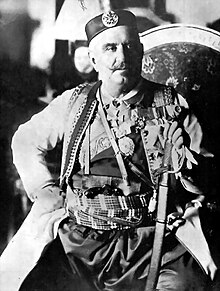Nicholas I of Montenegro
| Nikola I | |||||
|---|---|---|---|---|---|

King Nikola I
|
|||||
| Prince of Montenegro | |||||
| Reign | 13 August 1860 – 28 August 1910 | ||||
| Predecessor | Danilo I | ||||
| King of Montenegro | |||||
| Reign | 28 August 1910 – 26 November 1918 | ||||
| Born |
7 October 1841 Njeguši, Montenegro |
||||
| Died | 1 March 1921 (aged 79) Cap d'Antibes, France |
||||
| Spouse | Milena Vukotić (m. 1860) |
||||
| Issue Detail |
Zorka, Princess of Serbia Milica, Grand Duchess of Russia Anastasia, Grand Duchess of Russia Danilo, Crown Prince of Montenegro Elena, Queen of Italy Anna, Princess Francis Joseph of Battenberg Prince Mirko Princess Xenia Prince Peter |
||||
|
|||||
| House | Petrović-Njegoš | ||||
| Father | Mirko Petrović-Njegoš | ||||
| Mother | Anastasija Martinović | ||||
| Signature | |||||
| Full name | |
|---|---|
| Nikola Mirkov Petrović-Njegoš |
|
Styles of King Nikola I |
|
|---|---|
 |
|
| Reference style | His Majesty |
| Spoken style | Your Majesty |
| Alternative style | Sir |
Nikola I Petrović-Njegoš (Serbian Cyrillic: Никола I Петровић-Његош; 7 October [O.S. 25 September] 1841 – 1 March 1921) was the ruler of Montenegro from 1860 to 1918, reigning as sovereign prince from 1860 to 1910 and as king from 1910 to 1918.
Nikola was born in the village of Njeguši, the ancient home of the reigning House of Petrović. His father, Mirko Petrović-Njegoš, a celebrated Montenegrin warrior, was elder brother to Danilo I of Montenegro, who left no male offspring. After 1696, when the dignity of Vladika, or prince-bishop, became hereditary in the Petrović family, the sovereign power had descended from uncle to nephew, the Vladikas belonging to the order of the black clergy (i.e., monastic clergy) who are forbidden to marry. A change was introduced by Danilo I, who declined the episcopal office, married and declared the principality hereditary in the direct male line. Mirko Petrović-Njegoš having renounced his claim to the throne, his son was nominated heir-presumptive, and the old system of succession was thus accidentally continued.
Prince Nikola, who had been trained from infancy in martial and athletic exercises, spent a portion of his early boyhood at Trieste in the household of the Kustic family, to which his aunt, the princess Darinka, wife of Danilo II, belonged. The princess was an ardent francophile, and at her suggestion the young heir-presumptive of the vladikas was sent to the Lycée Louis-le-Grand in Paris. Unlike his contemporary, King Milan of Serbia, Prince Nikola was little influenced in his tastes and habits by his Parisian education; the young highlander, whose keen patriotism, capability for leadership and poetic talents early displayed themselves, showed no inclination for the pleasures of the French capital, and eagerly looked forward to returning to his native land.
...
Wikipedia
